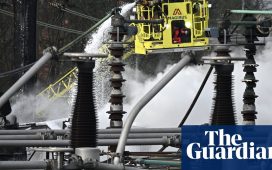Stay informed with free updates
Simply sign up to the UK energy myFT Digest — delivered directly to your inbox.
The final price tag for building the planned Sizewell C nuclear power station in Suffolk is likely to reach close to £40bn, according to people close to the negotiations over the flagship energy scheme.
The sum is double the £20bn estimate given by developer EDF and the UK government for the project in 2020, reflecting surging construction costs as well as the implications of delays and cost overruns at sister site Hinkley Point C.
The higher estimate is likely to raise questions over the government’s strategy for a nuclear power revival, at a time of stretched government finances and cost of living concerns.
EDF says that once up and running, Sizewell C should be able to supply low carbon electricity to the equivalent of about 6mn homes for 60 years.
The Treasury is due to decide whether to go ahead with the project in this year’s multiyear spending review, according to officials.
The UK government and French energy group EDF were the initial backers of Sizewell C but they are trying to raise billions of pounds from new investors, a process that is dragging on longer than planned.
Earlier this month the Department for Energy Security and Net Zero (Desnz) said it could not reveal the current cost estimate for the project as it was “commercially sensitive”.
But one senior government figure and two well-placed industry sources said that a reasonable assumption for the cost of building Sizewell C would be about £40bn in 2025 prices.
The government has already awarded £3.7bn of state funding to the project. Ministers had planned to reach a final investment decision by the end of 2024 but were forced to delay this until spring 2025. Now there is industry speculation that any deal could slip beyond the autumn.
Potential investors in Sizewell C include Centrica, Schroders Greencoat, Emirates Nuclear Energy Corporation and Amber Infrastructure Group.
According to accounts published at Companies House last week, Sizewell C is “continuing to make good progress in negotiations with private investors”.
Alison Downes, executive director of campaign group Stop Sizewell C, urged the government to “come clean” on the “massive true cost” of the project given that households would be paying upfront for its construction via a levy on energy bills. “This secrecy around Sizewell C is inexcusable.”
Dale Vince, a big Labour party donor and founder of green energy company Ecotricity, has written to the government’s new Office for Value for Money warning that the construction of Sizewell “will saddle consumers with higher bills long before it delivers a single unit of electricity”.
Speaking to the Financial Times, he added: “Nuclear is too expensive, too slow — and very expensive to contain at the end of its life.”

Nuclear power currently supplies about 14 per cent of the UK’s electricity and many experts say it will be critical to push to cut carbon dioxide emissions to net zero by 2050.
However, all but one of Britain’s current ageing fleet of plants is due to close by March 2030, potentially sooner if planned life extensions cannot go ahead.
Only one new nuclear power station, Hinkley Point C in Somerset, is currently being built in the UK but it is delayed and over budget.
The project is due to start generating in 2029 at the earliest, and cost up to £46bn. That compares with initial expectations from 2016 that it would start at the end of 2025 and cost £18bn.
Sizewell C uses the same European Pressurised Water technology as Hinkley Point C. EDF has said Sizewell C should be much cheaper partly because lessons will have been learned and supply chains will be more developed.
It is also being built using a different financial structure, the regulated asset base model, which is used in the water sector including to finance the new Thames Tideway sewage tunnel. Developers start getting paid during construction from consumers’ bills, rather than having to wait for the plant to be finished.
But there is scepticism inside government about how much lower Sizewell C’s price tag would be compared with Hinkley Point C.
Progress on the project has partly been knocked by the recent resignation on health grounds of Rob Holden as chair of Sizewell C Limited.
A spokesperson for Desnz said he did not recognise the “speculative” figure of £40bn for the cost of Sizewell C.
“The project is expected to reduce the cost of the electricity system, boost our supply of secure homegrown power and generate major investment nationwide.”










